The Fed Should Surprise Us.
Headline, The Wall Street Journal
I have come to the headquarters of The Federal Reserve System, the nation’s central bank, on a mission: from everything I’ve seen and heard on the news, all hell is about to break loose, and I want to be at ground zero when it happens.

It was this lurking feeling of looming disaster that caused The Wall Street Journal to wring its hands with concern back when former Fed Chairman Alan Greenspan was starting to complain about “irrational exuberance.” The editorial pages of the Journal rightly put their finger on the problem–a massively over-leveraged mortgage market, fueled by government subsidies–but it was too late, resulting in the “planet-shaking subprime-mortgage meltdown” of 2008. The quoted phrase comes from the weekend edition of the Journal, in which a biographer of Greenspan wrote that, in order to avoid another crash, “The Fed Should Surprise Us.” I don’t know whether the governors of the Fed have the wisdom and the courage they need to heed the Journal’s advice this time around.
I check in with the guard at the reception area, and am ushered into the office of Jerome H. “Jay” Powell, the current Chair of the Board. I understand that he is a sober, thoughtful academic type–he’s got degrees from Princeton and Georgetown with a long career in government behind him. One doesn’t get to be Secretary of the Treasury for Domestic Finance by being an office wag.
“Come in,” he exclaims cheerfully from behind his desk as he rises to greet me.
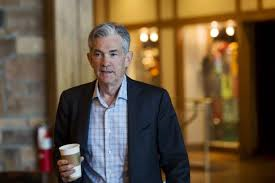
“Sure Whoopee Cushions are fun, but for the initial shock I like a good, old-fashioned hand buzzer.”
“Thanks for allowing me into the ‘inner sanctum,’” I say facetiously as I stride across the thick carpet that the Fed, unlike more parsimonious agencies, can afford thanks to the fees they charge big banks.
“Pleasure to have you,” he says with a smile as he grasps my right hand, sending shock waves up my arm.
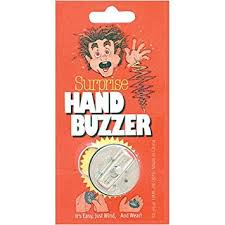
“Yow!” I exclaim, but more from shock than the irritating sensation his hand buzzer gives me. “Why”–here I bite my tongue to keep myself from using a profanity–“did you do that?”
“I dunno, I read in The Wall Street Journal Saturday that we’re supposed to surprise people.”
“I don’t think the guy meant it in that sense, it was more an argument against changing economic behavior by telegraphing what you’re going to do with rates.”
“Oh,” he says sheepishly. “It was the weekend, I didn’t really read the paper that closely. Would you like me to show you around a bit?”
“Sure,” I say, and he takes me down the hall after telling his secretary to take messages while he gives me a tour of the building.
We pass by the mail room where we see piles of correspondence stacked high upon tables.
“Wow–you guys must get a lot of important business correspondence, huh?”
“This is crank mail from right-wing conspiracy theorists. The threatening letters from left-wing populists are over in Room 4B.”
We stop at a water cooler, and Powell gulps down two cups. “Liquidity is very important,” he says as he crumples the little paper cone and drops it in a wastebasket. “Especially in a time of sudden asset deflation.”
He knocks gently on a closed oak door bearing the nameplate of Miki Bowman, seated at her desk.
“Miki, we have a visitor,” Powell says, as he introduces us. “Mr. Chapman is author of ‘Our Friends the Fed.’”
“I’m not familiar with it,” Bowman says. “Is it like one of our ‘Beige Books‘?”
“No, it’s not as funny as that,” I say.
Powell gives me a look like he’s just sniffed a carton of sour milk. I guess he takes his job controlling the world’s largest economy seriously.
“C’mon in,” Bowman says, and picks up a can from her desk. “You know, one of the benefits of being a Governor of the Federal Reserve System is the many wonderful presents we receive from grateful bankers across the nation. I just received a can of peanut brittle in this morning’s mail–would you like some?”
“Sure, I grew up in Missouri–I love peanut brittle. We used to buy it at Stuckey’s when we’d go down to the Lake of the Ozarks as kids.”
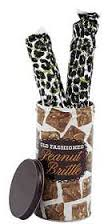
“I know it’s not good for my teeth, but I’m just crazy about the stuff,” Bowman says, as she struggles to open the can. “Damned arthritis,” she says. “I can’t get the top off.”
“Here let me help,” I say, as I take it from her hands. “My dad always emphasized the importance of having a strong grip.” I say, but before I can finish my reminiscence three fuzzy snakes come whooshing out of the can and hit me in the face.
“Ha! Got ya!” Bowman says, as she accepts a gleeful ‘high-five’ from Powell.
“You are such a cut-up!” he says.
I try to be a good sport about it, but I’m beginning to have my doubts about the people who have final say over the nation’s money supply. “Sure fooled me,” I say sheepishly. “But . . . can I ask you a question?”
“Shoot,” says Powell.
“Bang!” says Bowman, and they again break out in laughter.
“What I’m wondering is–should you really be fooling around with novelty items from a joke shop when we’re trying to reverse a depressed labor force participation rate?”
Powell’s face takes on a serious look. “Well, perhaps not when you look at the long and distinguished history of this institution, going all the way back to William McChesney Martin.”
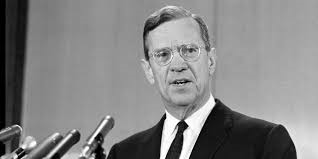
William McChesney Martin: “No punch for you!”
“He’s the one who said ‘The job of the Fed is to take away the punch bowl just as the party gets going,’” Bowman adds with obvious pride.
“But then we read in the Journal that we’re supposed to surprise people,” Powell says. “So–peanut brittle!”
Okay, I say to myself. Everybody’s entitled to a little office fun, even the Fed. Perhaps especially the Fed. I wouldn’t want them screwing up the job and life prospects of my sons, just starting out in their careers, with the sort of hyper-inflation I lived through back when–speaking of peanuts–Jimmy Carter was president.
“Well, I’ve got to get back to work,” Powell says.
“Or appearing to work,” Bowman says, verbally goosing her male colleague in the hope that he’ll do something about industrial productivity before the end of the year.
“Nice to meet you,” Powell says, but I spurn his offer of a handshake for fear of getting the hand-buzzer treatment again. “Nothing personal,” I say. “I’m kind of a germophobe.”
Bowman escorts me down to the end of the hall, where a windowless door–ever-so-slightly ajar–is decorated with the creepy pyramid that appears on the dollar bill.
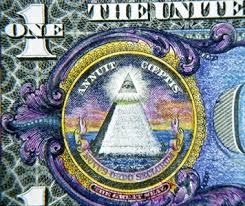
“What’s in there?” I ask.
“It’s kind of a secret,” Bowman says, as she starts to make a right turn down a perpendicular corridor.
“Well, I wouldn’t be doing my job as an investigative reporter if I let you keep me away from the inner workings of the American economy with such a casual brush-off,” I say, getting my back up a bit.
Bowman looks at me for the first time with an expression of concern. “I really shouldn’t let you in there,” she says.
“All the more reason for me to see what you’re hiding,” I say. “This is the problem with the Fed. You lack transparency, you’re not politically accountable, you . . .”
“All right, fine,” she says, with resignation. “We probably never should have agreed to let you in to the Federal Reserve Bank, but since you insist on seeing everything . . .”

“Thank you,” I say, trying to be gracious but firm. “Americans have a right to know what you people do here.”
“Don’t rub it in,” she says.
“It’s their money,” I say as I open the door–and a bucket of water falls on my head.
“What the . . .”
“Surprise!”
Available in Kindle format on amazon.com as part of the collection “Our Friends, the Fed.”



Oh, those crazy Feds!